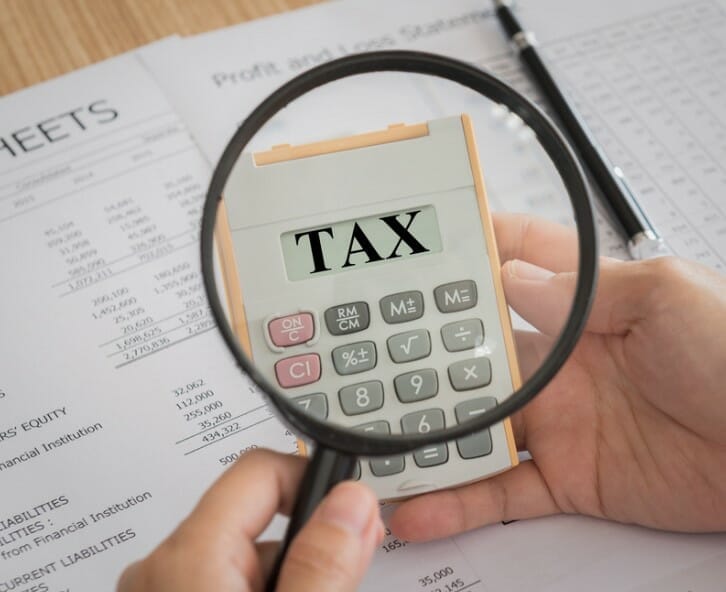When I first learned about Roth IRAs, I thought the whole point of them was to eliminate taxes. Well, in essence, pay the taxes first and then pay no taxes later. But then you have dividends. If you find yourself asking, “Are Roth IRA dividends taxable?” the answer is—probably not, but it depends.
First let’s talk about the basics of the Roth IRA.
Like I said, the essence is that you pay the taxes once and then don’t pay any ever. Basically, the paycheck that is direct deposited into your checking account has already been taxed through income taxes.

When you buy stocks and other related securities, you will be taxed on capital gains taxes and dividend taxes.
For a Roth IRA, as long as you follow the rules when it comes to the age you can withdraw (generally at 59 1/2) and other rules (like your account is at least 5 years old), then you won’t pay capital gains or dividend taxes.
Roth IRA Dividend Taxes for Real Estate Investment Trusts (REITs)
REITs generally have their own tax implications which are a little different than a regular U.S. stock, if you are buying REITs in a taxable account.
But for the purposes of a Roth IRA, they are treated the same as regular stocks.
That means no dividend taxes for REITs in a Roth IRA and no capital gains taxes for REITs in a Roth IRA.
REITs have their own special taxes related to “return on capital” (ROC), but these are not applicable to Roth IRAs and whether Roth IRA dividends are taxable or not. Thankfully.
Roth IRA Dividend Taxes for Master Limited Partnerships (MLPs)
If you look into certain highly capital intensive industries such as midstream natural gas pipelines, you’ll see that most of them are structured as MLPs.
In a nutshell, these are partnerships and are different than a corporation or REIT.
The problem with these partnerships is that they come with different tax rules as well as different annual tax forms due to their structure. Part of the different tax rules is dividends on these being considered “unrelated business taxable income,” or UBTI.
Unfortunately, any dividends regarded as UBTI are still taxable even if they’re in a Roth IRA.

That means you will have to deal with the paperwork headaches that come with partnership/UBTI income as well as pay the taxes, out of your own post-tax pocket, on those dividends every year.
I don’t recommend buying MLPs in this case due to the Roth IRA dividends being taxable (and due each year!) when buying those vehicles.
Roth IRA Dividend Taxes for International Stocks (ADRs)
All of the above applies to U.S. investors buying any U.S. stock.
However, things can get a little tricky if you are buying international stocks. That’s where ADRs (American Depositary Receipts) come in.
The general problem with buying stocks which are headquartered outside the U.S. is that you can be subject to double taxation.
In other words, you can (and might) be taxed in the foreign country as well as in the U.S.
To combat this, there is a foreign tax credit and/or foreign tax deduction which was set up by the IRS. It should (generally) help you avoid this double taxation problem.
But remember, a tax advantaged account like a Roth IRA doesn’t have to pay capital gains and dividend taxes. This is true except for foreign dividends, like those you receive through an ADR.
In a peculiar detail about the taxation of foreign dividends… Most of the time, U.S. investors will have their foreign dividends withheld by the foreign government. The U.S. will also tax this dividend, but will offer you the foreign tax credit/deduction option to offset the double taxation.
However, if you are holding this ADR in a tax-advantaged retirement account—like a Roth IRA, IRA, or 401k—you are not eligible for the foreign tax credit/deduction.
This means that for dividends paid to a Roth IRA by a foreign country, the foreign company will automatically withhold your foreign dividend taxes and you will not be able to apply a credit/deduction to get that back. You are taxed in that case, but don’t have to fill out any complicated tax forms.
ADR Taxes in a Roth IRA Example
Say there was an ADR in a foreign country where the company pays $3.00 in dividends per share. But let’s say the dividend tax in the foreign country was 25%. The foreign company would pay you $2.25 (25% less) in dividends instead of the $3.00 that the company pays out to account for the international dividend taxes.
In the case of a Roth IRA, you receive the $2.25 in dividends and that is the extent you will be taxed. The U.S. government will not “double tax” you because it is in a Roth IRA.
What’s nice about an ADR in a Roth IRA is that you won’t get taxed on the capital gains.
This is because, for whatever reason, most foreign countries will not charge you a capital gains tax on ADRs; only the U.S. will. But since we have the shares in a Roth IRA, the U.S. capital gains will not be applied to us and so we will pay zero capital gains taxes.

Refer to my extensive blog post about taxes for buying an ADR, where I showed two examples: one of countries that do withhold a dividend tax to U.S. shareholders and one example of a country that doesn’t.
What’s nice about buying ADRs in a Roth IRA is that the only inconvenience is the tax on the dividends. We don’t have to fill out complicated tax forms each year, and there’s no other significant taxes outside of that.
If the ADR is domiciled in a country where dividend tax rates are low, then that’s an additional plus.
Investor Takeaway
I hope this short guide on taxes for dividends received in a Roth IRA was easy to follow and cleared up any confusion for you. The power of compounding dividends can be a life changing catalyst for building wealth, so don’t let the complicated and special rules keep you away from them!
There is always the possibility that laws change, so don’t be afraid to reach out through email if you see discrepancies or are still unclear about something. We want to help!
I’m not a tax expert and so don’t take this post as personalized, professional advice. This was all based on what I could gather from sources online as well as my own personal experiences in holding various types of securities, and especially the annoying paperwork I was mailed every year from a single MLP.
Some sources for additional tax-related information which helped me understand these Roth IRA dividend rules: Investopedia; Turbo Tax; Morningstar.
Updated: 08/17/22
Related posts:
- How to Find the ADR Dividend Tax Policy of a Company in Minutes An ADR, or American Depositary Receipt, is a simple type of share that allows U.S. investors to invest in companies headquartered outside the U.S. But...
- Capital Gains Tax Calculator for Relative Value Investing Turnover of investment holdings is a natural occurrence in any portfolio that triggers realized capital gains and taxes, which can eat into a portfolio’s return....
- Investment Terms Everyone Should Know Updated 9/3/2023 If you are new to investing, all the terms and jargon might seem overwhelming. But today’s post will help you learn some of...
- Qualified Dividends are Your Way to Minimize Tax on Reinvested Dividends! Long story, short, the answer is yes – you are going to have to pay taxes on reinvested dividends. While there are a ton of...
